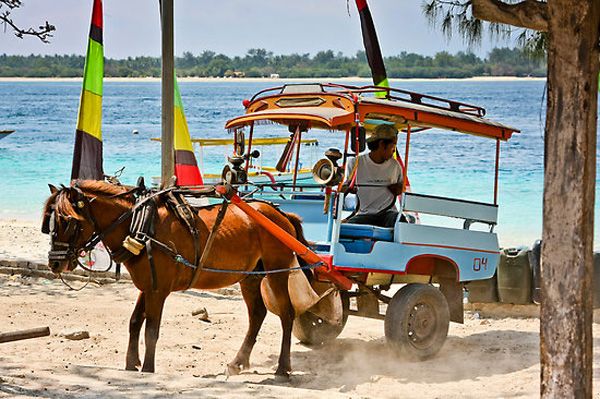One of the most common, boring themes in travel writing is a lament about places being “discovered,” thereby becoming popular, played-out and impure.

Travelers love to talk about how they were at this or that place “back in the 70s” or during some other golden age was and that things today just aren’t “the same.”
Well, nothing in the universe stays the same and no place within its bounds will remain unchanged.
That being said, I was surprised by the lack of change of the Gilis, three island paradises between Lombok and Bali, Indonesia.
In fact, it seems as though the phenomenon of too many people being led by Lonely Planet to travel destinations and, once there, somehow de-flowering that special place is not affecting the islands all that much.
The three Gilis islands are Trawangan (the biggest and busiest), Air (a medium-sized island) and Meno (the smallest of the three). They all offer pristine beaches, scuba diving, delicious grilled fish, yoga retreats, reggae bands, sensational live music and a predictably laid-back atmosphere.
One gets the impression that even in the event of a Martian invasion no one on the islands would be hurrying or panicking.
One of the nicest things about the Gilis is that there are no motorbikes. As far as I could gather from a proprietor of one cafe at which I spent an afternoon, this was a decision taken by the locals to prevent air and noise pollution. Instead, horse carts bounce up and down the dirt paths along beaches, shuttling tourists to their bungalows.
On the biggest island, Gili Trawangan, there are places to stay and eat on only one side of the island, and the interior is sparsely inhabited. As soon as the beach is out of sight, tourists are few and far between. This is also the case on the other two islands.
Comparing my impressions of the Gilis from the first time I traveled there ten years ago and my most recent trip just a few months ago, and considering the larger number of visitors to the tropical paradises nowadays, it does not seem as if the Gilis have been forced to change all that much.
While sipping coconut water on the beach as salty air whipped around me, the bells on horse carts jingling in the distance, it somehow seemed as if the islands would remain a low-key destination for decades to come, no matter how many people travel there.
I guess that some places are just special.